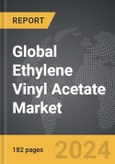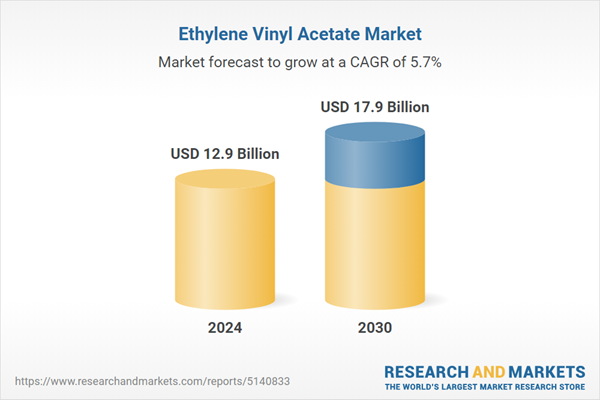Global Ethylene Vinyl Acetate (EVA) Market - Unveiling Key Trends & Growth Catalysts
Why Is Ethylene Vinyl Acetate (EVA) Becoming a Material of Choice Across Industries?
Ethylene Vinyl Acetate (EVA) has emerged as a highly versatile polymer, widely recognized for its flexibility, impact resistance, and durability. This copolymer, produced by polymerizing ethylene with vinyl acetate, offers superior processing properties, making it a preferred material in multiple industries, including footwear, packaging, automotive, healthcare, and solar energy. Its ability to combine rubber-like elasticity with thermoplastic processability has made it an ideal substitute for traditional materials such as PVC, rubber, and other polymer blends.The demand for EVA has seen a significant boost due to its extensive use in lightweight, shock-absorbing applications such as sports shoes, yoga mats, and protective padding. Additionally, EVA films and foams have gained traction in industrial and consumer packaging, thanks to their excellent sealing, adhesion, and moisture resistance properties. The solar energy sector is another key driver of EVA adoption, as EVA sheets serve as encapsulants in photovoltaic (PV) modules, protecting solar cells from environmental factors while enhancing durability and efficiency. With the global emphasis on renewable energy, sustainable packaging, and high-performance materials, EVA continues to experience strong demand across diverse applications.
How Are Technological Advancements and Sustainability Trends Shaping EVA's Market Growth?
Innovations in EVA formulation and processing technologies have significantly enhanced its performance and expanded its application scope. One of the most transformative advancements in EVA production is the development of high-vinyl acetate content grades, which improve flexibility, adhesion, and transparency. These advanced EVA grades are widely used in hot melt adhesives, medical packaging, and impact-resistant applications. Additionally, the introduction of cross-linked EVA foams has improved resilience and heat resistance, making them ideal for automotive interiors, sports equipment, and insulation applications.Sustainability has also become a key focus in EVA production, with manufacturers investing in bio-based EVA derived from renewable feedstocks such as sugarcane. This shift aligns with global sustainability initiatives aimed at reducing dependence on fossil fuels while offering environmentally friendly alternatives to conventional plastics. Furthermore, EVA's recyclability has made it a preferred material in sustainable packaging and circular economy models, encouraging companies to incorporate recycled EVA content into their product lines. With increasing regulatory pressure on plastic waste reduction and eco-friendly manufacturing practices, EVA is set to play a pivotal role in the transition toward greener, more sustainable materials.
Which Industries Are Driving the Rising Demand for EVA?
The footwear industry remains one of the largest consumers of EVA, leveraging its lightweight, flexible, and cushioning properties in shoe soles, midsoles, and insoles. Global brands in athletic footwear, such as Nike and Adidas, incorporate EVA foam to enhance comfort and shock absorption, catering to the growing demand for high-performance sports and casual footwear. The packaging industry is another significant driver of EVA demand, as the polymer's excellent sealing and adhesive properties make it an ideal choice for stretch films, laminated packaging, and protective films in food and pharmaceutical applications.The renewable energy sector has also emerged as a major contributor to EVA market growth, with the increasing adoption of solar energy solutions. EVA encapsulants play a crucial role in enhancing the efficiency and durability of photovoltaic (PV) modules, ensuring long-term performance and protection against moisture and UV degradation. Meanwhile, the automotive industry utilizes EVA in soundproofing, interior trims, and weather-resistant components, while the healthcare sector relies on EVA for medical-grade tubing, IV bags, and drug delivery systems due to its biocompatibility and non-toxic nature. As these industries continue to expand, the demand for EVA is expected to rise, reinforcing its status as a high-performance polymer with widespread applications.
What's Fueling the Rapid Growth of the EVA Market?
The growth in the global ethylene vinyl acetate (EVA) market is driven by several factors, including the increasing demand for lightweight and impact-resistant materials in footwear, packaging, and renewable energy sectors. The rising popularity of sustainable and recyclable materials has further propelled the adoption of EVA in eco-friendly packaging solutions, where its flexibility and durability offer a superior alternative to traditional plastics. Additionally, the expanding solar energy industry, particularly in Asia-Pacific and Europe, has significantly boosted EVA consumption, as encapsulants play a critical role in ensuring the longevity and performance of solar panels.Technological advancements in EVA processing, including improved cross-linking techniques and the development of bio-based variants, have also contributed to market expansion. The growing demand for sports and athletic gear, driven by increasing health consciousness and fitness trends, has further strengthened EVA's market position in the footwear and protective equipment industries. Meanwhile, the automotive sector's focus on lightweight materials for fuel efficiency and sustainability has created new opportunities for EVA-based components in vehicle interiors and insulation. With increasing investments in renewable energy, eco-friendly packaging, and high-performance consumer goods, the EVA market is poised for substantial growth, cementing its role as a key material in modern industrial and consumer applications.
Report Scope
The report analyzes the Ethylene Vinyl Acetate market, presented in terms of market value (USD). The analysis covers the key segments and geographic regions outlined below.- Segments: Type (High Density Ethylene Vinyl Acetate (HEVA), Low Density Ethylene Vinyl Acetate (LEVA), Medium Density Ethylene Vinyl Acetate (MEVA)); End-Use (Consumer Goods, Automotive, Packaging, Healthcare, Other End-Uses).
- Geographic Regions/Countries: World; United States; Canada; Japan; China; Europe (France; Germany; Italy; United Kingdom; Spain; Russia; and Rest of Europe); Asia-Pacific (Australia; India; South Korea; and Rest of Asia-Pacific); Latin America (Argentina; Brazil; Mexico; and Rest of Latin America); Middle East (Iran; Israel; Saudi Arabia; United Arab Emirates; and Rest of Middle East); and Africa.
Key Insights:
- Market Growth: Understand the significant growth trajectory of the High Density Ethylene Vinyl Acetate (HEVA) segment, which is expected to reach US$7.8 Billion by 2030 with a CAGR of 6.5%. The Low Density Ethylene Vinyl Acetate (LEVA) segment is also set to grow at 4.9% CAGR over the analysis period.
- Regional Analysis: Gain insights into the U.S. market, valued at $3.4 Billion in 2024, and China, forecasted to grow at an impressive 8.7% CAGR to reach $4.1 Billion by 2030. Discover growth trends in other key regions, including Japan, Canada, Germany, and the Asia-Pacific.
Why You Should Buy This Report:
- Detailed Market Analysis: Access a thorough analysis of the Global Ethylene Vinyl Acetate Market, covering all major geographic regions and market segments.
- Competitive Insights: Get an overview of the competitive landscape, including the market presence of major players across different geographies.
- Future Trends and Drivers: Understand the key trends and drivers shaping the future of the Global Ethylene Vinyl Acetate Market.
- Actionable Insights: Benefit from actionable insights that can help you identify new revenue opportunities and make strategic business decisions.
Key Questions Answered:
- How is the Global Ethylene Vinyl Acetate Market expected to evolve by 2030?
- What are the main drivers and restraints affecting the market?
- Which market segments will grow the most over the forecast period?
- How will market shares for different regions and segments change by 2030?
- Who are the leading players in the market, and what are their prospects?
Report Features:
- Comprehensive Market Data: Independent analysis of annual sales and market forecasts in US$ Million from 2024 to 2030.
- In-Depth Regional Analysis: Detailed insights into key markets, including the U.S., China, Japan, Canada, Europe, Asia-Pacific, Latin America, Middle East, and Africa.
- Company Profiles: Coverage of players such as Advanced Polymers, Celanese Corporation, Daicel Miraizu Ltd., Exxon Mobil Corporation, Flex-Pak corporation. and more.
- Complimentary Updates: Receive free report updates for one year to keep you informed of the latest market developments.
Some of the 13 companies featured in this Ethylene Vinyl Acetate market report include:
- Advanced Polymers
- Celanese Corporation
- Daicel Miraizu Ltd.
- Exxon Mobil Corporation
- Flex-Pak corporation.
- Japan Vam & Poval Co., Ltd.
- LyondellBasell Industries Holdings B.V.
- Marco Polo International Inc.
- Novacavi SpA
- NSB Polymers GmbH
This edition integrates the latest global trade and economic shifts into comprehensive market analysis. Key updates include:
- Tariff and Trade Impact: Insights into global tariff negotiations across 180+ countries, with analysis of supply chain turbulence, sourcing disruptions, and geographic realignment. Special focus on 2025 as a pivotal year for trade tensions, including updated perspectives on the Trump-era tariffs.
- Adjusted Forecasts and Analytics: Revised global and regional market forecasts through 2030, incorporating tariff effects, economic uncertainty, and structural changes in globalization. Includes historical analysis from 2015 to 2023.
- Strategic Market Dynamics: Evaluation of revised market prospects, regional outlooks, and key economic indicators such as population and urbanization trends.
- Innovation & Technology Trends: Latest developments in product and process innovation, emerging technologies, and key industry drivers shaping the competitive landscape.
- Competitive Intelligence: Updated global market share estimates for 2025, competitive positioning of major players (Strong/Active/Niche/Trivial), and refined focus on leading global brands and core players.
- Expert Insight & Commentary: Strategic analysis from economists, trade experts, and domain specialists to contextualize market shifts and identify emerging opportunities.
Table of Contents
Companies Mentioned (Partial List)
A selection of companies mentioned in this report includes, but is not limited to:
- Advanced Polymers
- Celanese Corporation
- Daicel Miraizu Ltd.
- Exxon Mobil Corporation
- Flex-Pak corporation.
- Japan Vam & Poval Co., Ltd.
- LyondellBasell Industries Holdings B.V.
- Marco Polo International Inc.
- Novacavi SpA
- NSB Polymers GmbH
Table Information
| Report Attribute | Details |
|---|---|
| No. of Pages | 182 |
| Published | January 2026 |
| Forecast Period | 2024 - 2030 |
| Estimated Market Value ( USD | $ 12.9 Billion |
| Forecasted Market Value ( USD | $ 17.9 Billion |
| Compound Annual Growth Rate | 5.7% |
| Regions Covered | Global |









